With more than a hundred dead and thousands displaced. MSF, with its emergency team, has been supporting the hospital and the local health center for two weeks in the Central African Republic.
The conflict has been unleashed in recent weeks in several cities in the Central African Republic (CAR). Alindao, in the center of the country, is one of them, with more than a hundred dead and thousands displaced. MSF, with its emergency team, has been supporting the hospital and the local health center for two weeks and is involved in a vaccination campaign for more than 7,000 children.
The situation in Alindao remains very tense: last weekend the self-defence groups tried to attack the city again by first taking its airstrip and then breaking into the Catholic mission where more than 15,000 people were taking shelter. Members of the self-defense groups also confronted members of MINUSCA, the United Nations mission for CAR, and in the last two days, there have been clashes in villages on the outskirts of Alindao, only twenty kilometers away.
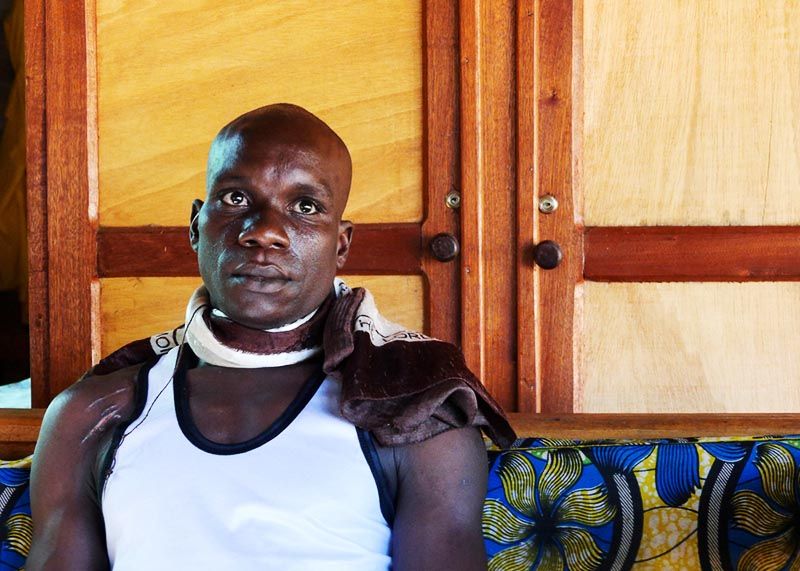
Alindao had been praised as an exemplary city: Banda and Yakoma Christians, and Peuhl and Rounga Muslims, different ethnicities, religions, and languages living in a quiet community of around 20,000 people. Their relations did not change when the Séléka coalition (composed of armed groups from the north of the country, mostly Muslim) took the city and the whole country in 2013. But on 8 May last, Alindao was a scene of warfare between self-defence Christian groups and Muslim military groups who were in control of the city.
Alindao thus became another city like Bria, Bambari or Bangassou which, in recent weeks, have succumbed to the repetition of the bloody conflict that ravaged the country in 2013/2014: killings, executions, and over one hundred thousand people fleeing their homes in the central and eastern part of the country.
These recent events were triggered by a minor incident in Alindao. The Muslim combatants arrested two young men; this escalated to the slaughter of at least 133 civilians, entire neighbourhoods being set alight, and the majority of the population, fifteen thousand people, fleeing to take refuge in the city’s Catholic mission. “The two boys were accused of being in the self-defence groups. Then, to put pressure on and demand their release, the self-defence group kidnapped the family of one of the Séléka. Shootings then began. This was on Sunday and Monday.
On Tuesday, the situation worsened when they started with the civilian population”, says Elisée R, 27. “They told the women to leave their homes, and that they had nothing against them. Then they burned the houses. When I saw that they were starting to burn mine, I had to leave. They shot me in the shoulder and I fell down. I played dead, that's how I survived”. Paul A., who does not know his age, “more than sixty”, fainted after being shot in the arm and in the cheek. “We don’t know how many people died, they threw a lot of bodies into wells”.
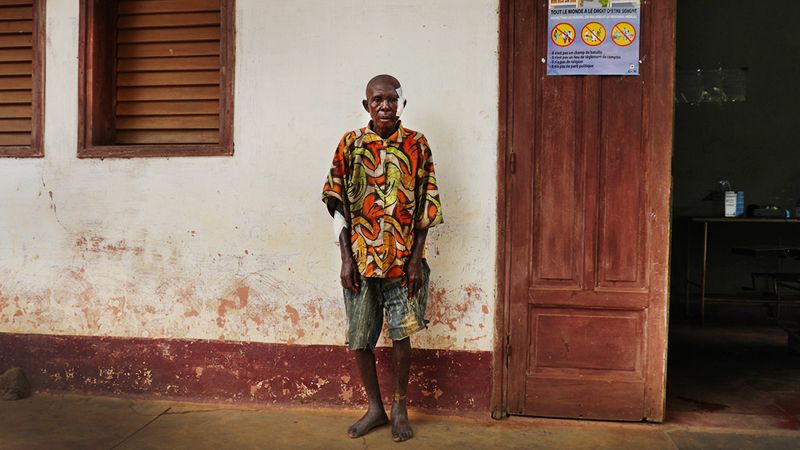
The displaced people of the Catholic mission do not know when they will be able to return to their neighbourhoods: “there’s still a lot of fear and it’s possible that the self-defence groups will want revenge. We won’t go back until there is peace in Alindao”, says Elisée. The mission is protected by MINUSCA, the force deployed by the United Nations. During the day, women can go to the camps and pick up food and firewood to sell, to get by. Men do not dare leave the camp, for fear of being attacked.
The uneasy calm perceived in Alindao is not like in other towns on the outskirts. The town of Seigneur, 35/40 km away, was attacked on Tuesday 23. A man accused of being a combatant was forced to pay a large sum of money, decided not to pay, to leave the town and to constitute his own group in order to attack. They were rejected and in revenge, “all the houses were burnt. The Catholic mission, the mosque, and four houses remain standing”, says Germaine Y., 35.
Germaine fears that her 17-year-old eldest daughter, who was shot down by a bullet whilst fleeing, is dead. Her second son, aged six, was shot in the leg. Irene’s seven-year-old girl has a bullet in her side, close to her chest. She was wounded when they fled. Her mother-in-law was shot dead when they were running across the market. Irene and her children took refuge in the woods, and five days later they arrived at Alindao hospital.
“Yesterday I found out that my husband and my eldest son, who had stayed in the fields during the attack, were killed when they returned to the village to pick up the body of my mother-in-law. I don’t know what will happen to us, we have nothing, we have nothing left”. “We hid in the woods, but they also ordered the women and children to get out of there and go on the roads”, says Charlotte Kapo, who was shot in the leg.
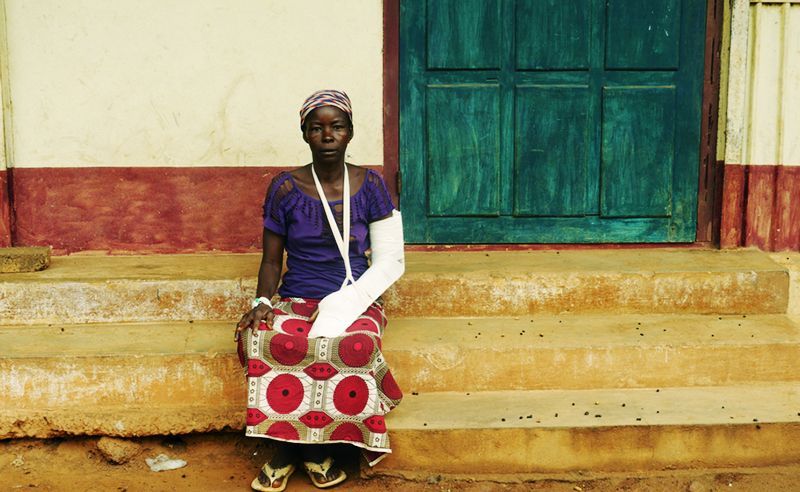
The consequences of the war are visible in the thousands of displaced people, but spending days in the forests also has indirect consequences: a lack of food and water, mosquito bites and the contraction of malaria or, as in the case of Idriss A., snake bites. “We knew that Seigneur was going to be attacked and we ran out of there with nothing but the clothes we were wearing. While I was running, a snake bit me. I thought it would be nothing because it didn’t hurt.
Afterward, I started feeling the heat and terrible pain. I held on for several days. When my brother saw that the wound was really bad, he decided it would be better for me to die in the village than in the woods”. In the neighbouring town of Odjo, they asked for money to cure it. He resorted to traditional medicine, which didn’t work. He arrived at Alindao hospital with a large section of his calf open, purulent, eaten away by the infection.
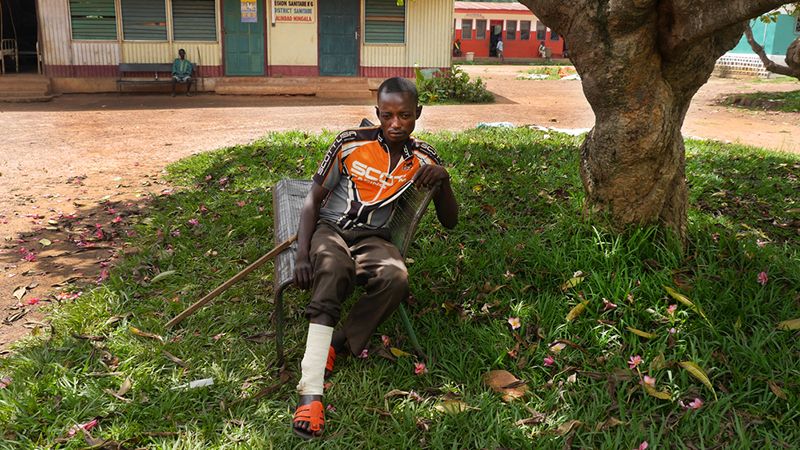
An unfinished war, with an uncertain disarmament process and social reconciliation a long way off, added to internal tensions within the Séléka coalition, officially dissolved in 2014, are the causes of the conflict. Members of the Front Populaire pour la Renaissance de Centrafrique (FPRC), —Muslims— have just allied with self-defence or anti-balaka groups —Christians— to attack their former allies of the Mouvement pour l’Unité et la Paix en Centrafrique (UPC), in which the Peuhl members of the coalition are integrated.
Thousands of Muslim Peuhls have been attacked and expelled from their villages. Many of them have arrived in Alindao. Sadatu O., 38, fled Nzako with her five children when the population suffered an attack by the alliance between FPRC and anti-balaka. “We spent 22 days living in the woods, walking. More than two hundred people left Nzako. Finally, the UPC generals brought us a truck and vans which took us to Alindao. That was three months ago. Here we have received the support of the community. My husband is in Bangui and I hope to be reunited with him”.
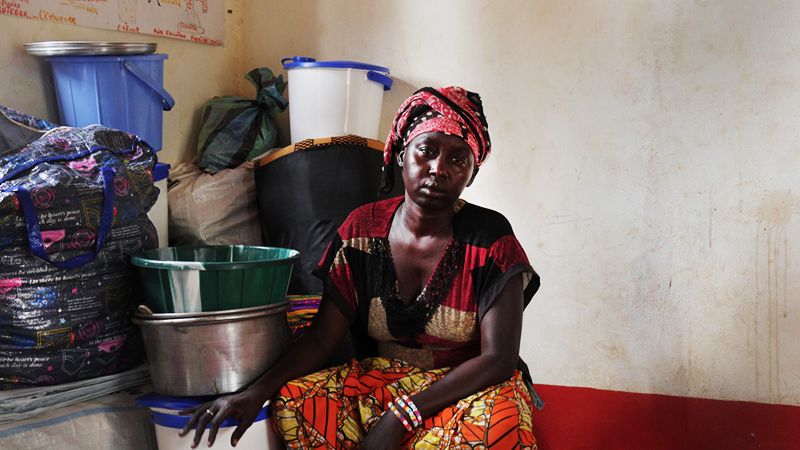
Unlike Sadatu, many Peuhls from Nzako, Bria or Bambari are thinking of staying in Alindao.
This was not the case with Adamu G., a peuhl who was camping with his family and his group of around fifty people just outside Seigneur. They were on their way to Ippy, to sell their herd of fifty cows. The anti-balaka attacked them.
“I was in my hut, a man came up and started firing, without saying a word”. He was shot six times in the head, groin, belly, side, and in the hand. Fortunately, the anti-balaka who attacked him only used hunting weapons, which were not very powerful. Having spent five days in the woods, he is now bed-ridden in Alindao hospital. “My father, too old to run, is probably dead. I’m sure my little brother, who is disabled, is dead too”. The rest of Adamu's family is still scattered.
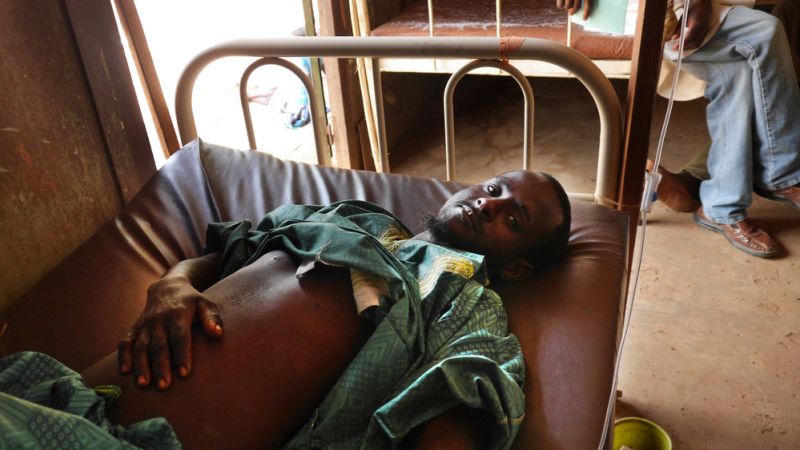
Find out more about MSF's activities in the Central African Republic
The MSF emergency team known as EURECA (Central African emergency team, in its French acronym), has been working in Alindao for two weeks. They support the hospital in the treatment of serious cases and war wounds and they also collaborate with the health centre located next to the Catholic mission and help those patients who need to be transferred to the hospital (many displaced people at the mission do not dare to go to the hospital since they have to cross the city centre and are afraid of being attacked).
In addition to training medical staff to enact an emergency response plan for incidents generating large numbers of casualties, they have started a vaccination campaign which aims to reach all the children in the area, numbering close to 7,500. Children will be inoculated with the pentavalent vaccine, as well as being immunised against measles.